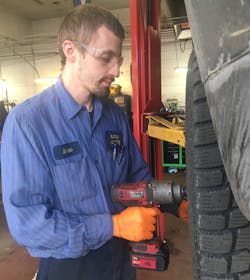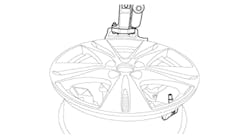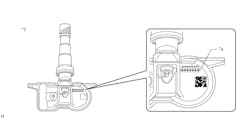What’s the most significant challenge facing independent tire dealers as the new year starts? MTD recently posed that question to several randomly selected dealers in different parts of the country.
Issues like employee recruitment and retention, scheduling, facility expansion, SKU management and inventory forecasting were cited — with the technician shortage emerging as most dealers’ primary concern. Here’s what they had to say.
Help wanted (and needed)
Mike Spitale, manager of Parrish-McIntyre Tire Co. in Akron, Ohio, says finding employees will be his top challenge in 2020.
“Our biggest problem is we don’t have enough qualified people,” he notes. “And that’s true at every single position at every tire store you can find. I have 16 bays. I’m the only person at the sales counter, and I have two full-time guys in the back.”
One performs tire work and oil changes. The other handles miscellaneous mechanical duties. “I give them 10 cars a day and that’s their limit. If two or three unscheduled walk-ups come in, we’re buried for the whole day. And if one of my guys is off work — say, for a vacation — we’re paralyzed.
“You can only push so many cars through a certain-size shop with so many people,” he says. “If we can get two cars done in an hour, we’re doing well.”
Employee retention is another challenge, according to Spitale. “It doesn’t matter what you pay. If someone else finds out you have a good guy, they’ll try to steal him — and it’s usually a car dealer, who will offer them the world.”
There are several new and used car dealerships near Parrish-McIntyre’s Akron location.
Cliff Ehlers runs Midwest Tire Co. Inc., a single-location dealership in Omaha, Neb. Employee retention has never been a problem for the company, which celebrated its 75th anniversary in 2019.
“I have two technicians who have been with me for 20 years,” says Ehlers.
However, two of the four technicians who work at Midwest Tire are in their late-50s. Another is older. “I’m not having a problem holding onto tire changers. But finding new alignment and brake techs is tough.”
Hiring techs away from local car dealerships isn’t an option. “Some dealerships send their techs off to school and then lock them down on contract,” he says.
And traditional advertising methods have been ineffective.
Ehlers believes the inability to find technicians is a generational issue. “A lot of people today aren’t interested in working on cars or working with their hands,” says Ehlers. “And a lot of schools have dropped their vocational tech programs.
“We also work Saturdays. A lot of kids want to work five days a week and then play on the weekend. But Saturday is an important day for us. We work from 7:30 until noon, and I tell them, ‘We’ll get you out of there at 12.’”
That often isn’t enough for them, he concedes.
Ehlers predicts that finding qualified technicians — or even locating inexperienced workers who are open to learning a new trade — will continue to be his biggest issue in 2020.
Chris Voss, owner of Performance Tire & Auto, a single-store dealership in Burlington, Wis., agrees that the employment pool “isn’t what it once was.”Like Ehlers, she also recognizes that employee expectations have shifted.
However, Voss says she is “very cautious about labeling the issue as generational in nature. I have some incredibly dedicated young people here.”
Two of the dealership’s service writers are in their early 20s. Two technicians are in their late 20s. “All of them work hard,” says Voss. “I wouldn’t trade them for the world.”
Voss started with the dealership, which derives 70% of its overall revenue from auto service work, 28 years ago. For most of that time, six-day work weeks were the norm.
But many of her employees, regardless of age, now place a higher premium on their personal time. In response, Voss recently moved to a five-day week, closing her company’s doors on Saturday.
“For decades, it’s been a six-day industry. I think that some of us, as owners, have to step back and realize” that times have changed.
“We used to staff solely based on customers’ expectations,” she says. “We are now putting our employees a little before our customers.”
Voss reports that clients have accepted the reduction. “Our customers are very loyal. They told us, ‘If this is what your employees need, we support it.’”
Looking ahead to the new year, “we’re sticking with our reduced-hours plan.”
A universal problem
Recruitment is an issue for dealers both small and large — including Mike Toumayan’s two Big O Tire stores in Southern California and McCarthy Tire Service Co. Inc., whose network extends throughout the northeastern United States.
Business has been growing steadily at Toumayan’s locations. But he says employing more technicians would make additional growth possible. Both of his stores have six bays and eight employees, including two technicians at each location.
Toumayan says that while he is not understaffed, the populations of the cities where he does business — San Clemente and Temecula — are increasing. Additional technicians would enable the stores to serve more customers.
“Having more hands on vehicles can get the customers back on the road faster,” he says.
In the meantime, Toumayan — who runs day-to-day operations at his dealership — is doing “whatever is necessary,” including servicing vehicles. (Nicole, his sister, handles administrative duties.)
Toumayan, who grew up in San Clemente, says he’s been able to build a loyal customer base doing service work “that is really necessary” for customers.
“We’re very particular about what we focus on. We’re not in it to get everything we can from a car.”
Adding employees and increasing bay turns is one part of Toumayan’s plans for 2020.
Because he grew up in Southern California, Toumayan also wants to do more for the people of San Clemente and Temecula, especially members of the military.
Back east, Modern Tire Dealer’s 2019 Tire Dealer of the Year, John McCarthy Jr., president of McCarthy Tire Service Co. Inc., says recruitment will be a top priority and challenge for the year ahead.
“It’s finding qualified teammates who want to come to work every day and start a career. Retention of those same teammates is an issue.”
The search for good workers also feeds into another one of the company’s biggest challenges for 2020.
McCarthy Tire Service operates 10 retread plants, and McCarthy says “our plants are at capacity right now.” The company is looking at all available options to increase capacity, whether it’s investing in new equipment or creating flexible work shifts.
The dealership could add production shifts, “but it’s a matter of finding people,” McCarthy says. “I think we’d have better luck with split shifts or extending shifts.”
This time of year, retread employees already are working nine- or 10-hour shifts, says McCarthy, who adds that no one in the company’s retread plants is working only 40 hours a week.
Like his counterparts at other dealerships, Jamie Tancre, general manager of Troy’s Tire Pros and Automotive in Mead, Wash., expects that finding good technicians will continue to be a challenge in 2020.
Tancre, who is a master mechanic, performs all diagnostic work at the dealership, which has four two-post racks and an alignment rack.
He says there is a huge shortage of employees for automotive work in his town, which is about 20 miles west of the Idaho border.
Although the labor market in his area is extremely tight, Tancre was able to hire a young technician with some basic auto service skills about a year ago. He is paying for additional training and says his new technician “has grown immensely, and I’m really hoping that he sticks with us.”
Don Mead, CEO of Callaghan Tire Inc. in Bradenton, Fla., is following suit by making significant investments in leadership development for high-potential employees at his company.
“The biggest challenge we will have in 2020 is acquiring and developing talented people to take the organization to the next level,” he says.
Callaghan Tire recently presented its first-ever training program that focused on fostering the leadership talent “that will be running this place in 5, 10 and 15 years.”
The company, which employs 177 people, operates 10 truck tire service centers, five industrial/material handling tire service centers, two retread plants and one retail service center.
Mead says one of his greatest responsibilities is to position Callaghan Tire for sustained performance, and the biggest variable when it comes to performance is people.
“You can have great strategies, but if you don’t have good people to execute them and a good culture that lets those people grow, develop, act and respond, it doesn’t matter.”
Sixteen employees from different levels and areas of the organization were selected for the initial training session. Salespeople, service center managers, operations managers and office managers, as well as Callaghan Tire’s leadership team, completed the two-day program, which was provided by a third-party company and is used by major corporations and the U.S. military.
Mead says it’s the foundation of the company’s leadership development curriculum.
“We’re trying to build a quality program and see it through. We don’t want this training to be individual events. We want it to be part of a well-thought-out plan.”
Another group of employees will complete the program in early 2020. Over the next 12 to 18 months, their core training will be supplemented with courses on other topics, such as emotional intelligence and finance basics.
Mead says the curriculum includes creating a plan for every participant to become an effective leader.
In addition to leadership development training, Callaghan Tire plans to continue several pilot programs involving light mechanical service and other disciplines that started in 2019.
“Sometimes you have little things in your business that you treat like a hobby,” says Mead. “Now we are treating them like key growth initiatives and profit drivers.”
Space and SKU management
The new year presents opportunities, too, according to McCarthy. His leadership team is looking at solutions to the lack of space at the company’s headquarters in Wilkes-Barre, Pa. There have been plans to retrofit and remodel about a third of an old brick warehouse into a modern corporate home. But the costs didn’t make sense.
McCarthy says his team is looking at ways to transform the company’s current home base into a better facility. But what form that will take is still up in the air.
One thing he does know is that McCarthy Tire Service will continue to expand its mobile mechanical services for trucks. “We’ve grown our fleet of mobile mechanical trucks, and we’re planning to do that again in 2020.”
More than 1,000 miles west of Wilkes-Barre, in Fargo, N.D., Dakota Wholesale Tire Inc. doesn’t have much control over what General Manager Antahn Volk considers to be the regional wholesaler’s biggest challenge: inventory.
Dakota Wholesale Tire serves tire dealers in North Dakota, South Dakota and Minnesota.
“There are so many different sizes and the proliferation of SKUs is so vast, you think you have enough (inventory) and then suddenly you have a run on one particular size and you can’t keep up,” he says.
Volk cites 265/65R18 as one example of a size that “everybody seems to be wanting.”
A couple of manufacturers have had it available, he says, while others have struggled to keep up with demand.
Dakota Wholesale Tire is working on its forecasting abilities so it can better coordinate with tire manufacturers on what’s needed in its market.
More than half of the company’s business is tied to passenger and light truck tires, but it also sells commercial, lawn and garden, ST radial, farm and light industrial off-the-road tires.
In mid-2019, the wholesaler invested in and installed a new inventory management system that Volk says will help it spot trends more quickly.
“It’s part of improving ourselves for our customers,” he says.
“We compete with all the national names in our markets, so we have to stay as up to speed on things as we can. If you’re consistent in what you do, customers appreciate that.
“That’s how we differentiate ourselves,” he adds. “We take care of the people who take care of us.” ■




